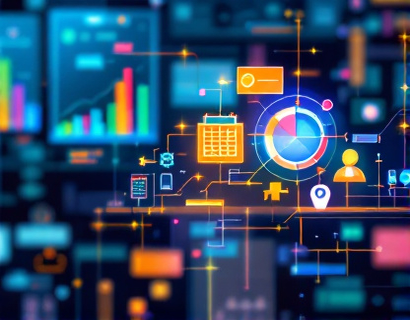AI-Powered Mental Health Insights: A Comprehensive Guide to Navigating Psychiatric Services and Industry Knowledge
In recent years, the integration of artificial intelligence in mental health services has revolutionized the way individuals access and understand psychiatric care. An AI-powered chat interface has emerged as a pivotal tool, offering specialized insights into psychiatric services and the broader mental health industry. This platform is meticulously designed to ensure content verification for accuracy and safety, making it an invaluable resource for a diverse audience that includes children, students, mental health enthusiasts, educators, and healthcare professionals. The goal is to provide reliable and responsible information, empowering users to engage with mental health topics with confidence and responsibility.
Understanding the Need for AI in Mental Health
The mental health landscape is complex and multifaceted, encompassing a wide range of conditions and services. Traditional methods of accessing information can be overwhelming, with vast amounts of data often leading to confusion rather than clarity. AI-powered chat interfaces address this challenge by providing a structured and user-friendly approach to navigating psychiatric services and industry knowledge. These tools leverage advanced algorithms and natural language processing to deliver personalized insights, ensuring that users receive information tailored to their specific needs and levels of understanding.
Key Features of AI-Powered Mental Health Chat Interfaces
One of the most significant advantages of AI-powered chat interfaces is their ability to offer content verification. This feature ensures that the information provided is accurate, up-to-date, and sourced from credible databases. For instance, when a user inquires about local psychiatric services, the AI can cross-reference this information with verified databases of healthcare providers, presenting a list of reputable clinics and hospitals along with their specialties and contact details. This level of precision is crucial in a field where the right information can significantly impact decision-making and well-being.
Another key feature is the adaptability of the chat interface to different user groups. For children and students, the language used is simplified and the content is made more engaging through interactive elements such as quizzes and infographics. This approach not only makes the information more accessible but also helps in building a foundational understanding of mental health concepts. For educators and healthcare professionals, the chat interface provides in-depth resources, including research articles, case studies, and best practice guidelines, all verified for accuracy and relevance.
Specialized Insights for Diverse User Groups
For children, the chat interface offers a safe and supportive environment to learn about mental health. Topics are presented in a friendly and approachable manner, using age-appropriate language and visuals. For example, a child asking about anxiety might receive a simple explanation of what anxiety is, along with tips on how to manage it, such as deep breathing exercises and talking to a trusted adult. The interface can also provide links to child-friendly resources and support groups, ensuring that young users have access to the help they need.
Students benefit from a more detailed and structured approach. The chat interface can provide information on how mental health affects academic performance, stress management techniques, and resources available on campus. For instance, a student seeking advice on managing exam stress might receive a list of recommended study strategies, relaxation techniques, and local counseling services. The AI can also offer guidance on when to seek professional help and how to approach teachers or counselors for support.
For mental health enthusiasts and educators, the chat interface serves as a comprehensive knowledge base. Users can explore topics such as the latest research in mental health, therapeutic approaches, and policy developments. For educators, this might include best practices for creating a supportive classroom environment, recognizing signs of mental health issues in students, and implementing mental health education programs. The AI can provide detailed explanations, supported by scientific studies and expert opinions, ensuring that the information is both accurate and actionable.
Healthcare professionals require the most in-depth and specialized information. The chat interface can offer detailed case studies, treatment protocols, and guidelines from reputable organizations such as the American Psychiatric Association. For example, a psychiatrist seeking information on a specific medication might receive a comprehensive overview of its indications, contraindications, side effects, and interactions with other medications. The AI can also provide updates on clinical trials and emerging treatments, helping professionals stay at the forefront of their field.
Ensuring Accuracy and Safety
One of the most critical aspects of an AI-powered mental health chat interface is the commitment to content verification. This involves rigorous checks to ensure that all information provided is accurate, current, and sourced from trusted databases. The AI is trained on a vast corpus of verified data, including peer-reviewed journals, official health organization guidelines, and expert opinions. This training process is continuously updated to incorporate the latest research and best practices in mental health.
To further enhance safety, the chat interface includes filters and moderation protocols to prevent the dissemination of misinformation or harmful content. Users can report any suspicious or inaccurate information, which is then reviewed and addressed by a team of mental health experts. This dual-layer approach ensures that the information remains reliable and trustworthy, providing users with peace of mind as they navigate sensitive topics.
Building Confidence and Responsibility
The AI-powered chat interface is designed to empower users to engage with mental health topics confidently and responsibly. By providing verified and contextually relevant information, users are encouraged to take an active role in their mental health journey. For instance, a user seeking information on depression might receive not only a definition and symptoms but also resources for self-help strategies and professional support options. This holistic approach helps users understand their condition better and makes informed decisions about their care.
Moreover, the chat interface promotes a culture of responsibility by emphasizing the importance of seeking professional help when needed. Users are guided to understand that while the AI can provide valuable insights and support, it is not a substitute for qualified mental health professionals. This balance ensures that users are motivated to seek the appropriate care while feeling supported throughout their journey.
Case Studies and Real-World Applications
To illustrate the practical benefits of an AI-powered mental health chat interface, consider a few real-world scenarios. In a school setting, a student named Alex feels overwhelmed by exam stress and turns to the chat interface for help. The AI provides Alex with a list of relaxation techniques, suggests speaking to a school counselor, and offers a link to an online support group for students facing similar challenges. This immediate and tailored support helps Alex feel less isolated and more equipped to manage their stress.
In a university environment, a student named Jamie is exploring options for mental health resources on campus. The chat interface provides Jamie with a detailed list of available counseling services, including their specialties, office hours, and contact information. Jamie can also access articles on stress management and mindfulness, which are verified and curated for relevance. This comprehensive resource helps Jamie make an informed decision about seeking help and taking proactive steps towards better mental health.
For healthcare professionals, the chat interface serves as a valuable tool for continuing education. A psychiatrist named Dr. Smith uses the AI to stay updated on the latest research on bipolar disorder. The chat provides Dr. Smith with a summary of recent studies, key findings, and recommendations for integrating new treatments into practice. This access to cutting-edge information helps Dr. Smith provide the best possible care for their patients.
Conclusion
The integration of AI in mental health services represents a significant advancement in making psychiatric care more accessible and understandable. An AI-powered chat interface that delivers specialized insights into psychiatric services and the mental health industry, verified for accuracy and safety, is a powerful tool for a broad audience. Whether you are a child, student, mental health enthusiast, educator, or healthcare professional, this platform provides reliable and responsible information to support your mental health journey. By fostering a culture of informed engagement and responsible use, we can collectively enhance mental health awareness and support, leading to better outcomes for individuals and communities alike.











































